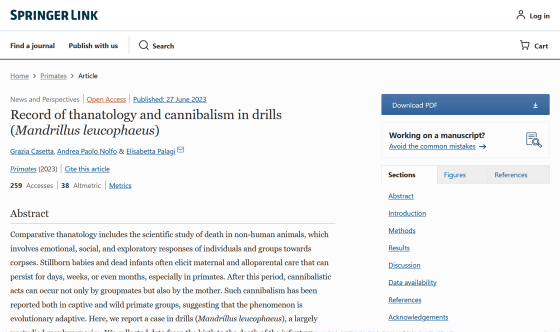A shocking case is reported in which a mother monkey eats the corpse of a baby she gave birth to after carrying it around for several days

Some animals are known to mourn the death of their fellow humans in the same way as humans, and it has also been
Record of thanatology and cannibalism in drills (Mandrillus leucophaeus) | SpringerLink
https://doi.org/10.1007/s10329-023-01075-8

Zoo monkey eats her baby's corpse after carrying it around for days | Live Science
https://www.livescience.com/animals/monkeys/zoo-monkey-eats-her-babys-corpse-after-carrying-it-around-for-days
In August 2020, a female drill named 'Kumasi' in a Czech zoo gave birth to a male. Although the baby did not appear to have any health problems, he died eight days after giving birth.
Kumasi continued to carry the baby's body for two full days after it died, refused to let go of the baby's body when herd mates came to examine it, and refused to let zookeepers carry the body. The researchers, who happened to be observing a herd of drills at the zoo at the time, speculate that Kumasi was unsure or unwilling to accept that the baby was dead.
The Kumasi carrying the corpse looked at the corpse as if to attract the baby's attention. Elisabetta Paraghi , a primate researcher at the University of Pisa in Italy and a member of the research team, said: ``Monkeys and apes often examine the faces of dead babies like this, and this probably detects eye movements. 'If the mother doesn't get any response from her baby, it probably suggests something is wrong.'
The image below is a picture of Kumasi actually examining the baby's corpse.

I also saw a figure holding a corpse as if it were protecting it from other monkeys.

However, as time passed without the baby's reaction, Kumasi lost his composure and started dragging and throwing the corpse. And in the end, Kumasi ate almost all of the baby's corpse. The mother did not share the baby's corpse with the herd of monkeys, but ate it herself.
The act of cannibalizing your own babies may seem frightening to humans, but the research team believes that Kumasi's actions had good reasons. 'Given that primate mothers expend an incredible amount of energy in childbirth, cannibalism can be viewed as an adaptive evolutionary trait that helps mothers recover post-pregnancy energy,' Palagi said. He explained that if the baby died, eating the corpse may increase the future reproductive success rate. Paragi argues that the fact that the mother did not share the carcass with other monkeys also supports this speculation.
Records of cannibalism by monkeys and primates are rare, but a 2020
Paragi et al.'s research team believes that the time when the drill baby died was one of the factors that caused cannibalism. 'The younger the baby, the less likely it is that the affection between mother and infant will be strong enough to prevent cannibalism,' Palagi said.

Related Posts:







